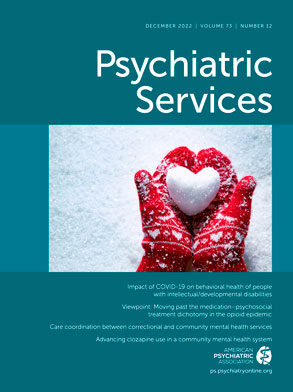Clozapine is the most effective antipsychotic medication for individuals with treatment-resistant schizophrenia and is considered standard of care for patients whose conditions have not responded to adequate trials of two or more other antipsychotics. Despite its superior efficacy, clozapine is underutilized, and increasing clozapine prescribing represents a public health priority.
To address clozapine underutilization, we developed a quality improvement project aimed at increasing clozapine prescribing at Cambridge Health Alliance, a public safety-net health system based in Greater Boston. In 2015, we created a clozapine clinic that established a group psychiatric visit, utilized primary care–based onsite laboratories, created patient tip sheets, enhanced resident education through seminars and a clozapine clinic rotation, held educational sessions for patients, integrated a clinical pharmacist into clozapine care, and initiated protocols for monitoring myocarditis. The weekly clozapine group visit was facilitated by two to three members of a multidisciplinary team (comprising a psychiatrist, psychiatry resident, nurse practitioner, and clinical pharmacist) and provided support for patients newly starting clozapine, experiencing adverse effects, or wanting to discuss shared experiences.
Our clozapine clinic sought to broaden support among patients and providers for expanded clozapine use by creating a tool kit that could be used by other health systems to overcome patient-, provider-, and system-related barriers. Interventions included provider and patient education, electronic health record (EHR) optimization, and e-consult support. Additionally, a quarterly clozapine-specific psychiatry department newsletter communicated updates on our initiatives.
We created a centralized clozapine-specific resource for providers via an internal Google Site. Provider-facing tip sheets provided information on clozapine prescribing and tips for managing adverse effects. Existing patient-facing tip sheets were expanded to provide additional resources for obtaining general information on clozapine and management of adverse effects. All tip sheets were available on the website for easy access by providers.
Seminars and grand rounds for psychiatry, internal medicine, and family medicine departments targeted provider education. Moreover, presentations for psychiatry residents and staff psychiatrists reached potential clozapine providers. Presentations included benefits of clozapine use, adverse effect management, how to talk with patients about clozapine, and available resources providing additional details on the medication. Surveys were distributed before each presentation to gauge attitudes of providers toward clozapine and evaluate existing knowledge, with the goal of providing educational presentations and surveys annually to track changes in attitudes and knowledge.
Using the EHR, we developed a best practice alert (BPA) to notify psychiatric providers of potential candidates for clozapine treatment on the basis of schizophrenia spectrum illness diagnosis, historical prescriptions for two or more antipsychotic medications, and no previous prescription for clozapine. Reports were built to identify candidates for clozapine treatment on the basis of comorbid conditions and clinical features (e.g., tardive dyskinesia, history of suicidal behavior, or recent psychiatric hospitalization). The team also shared documentation templates in the EHR as checklists for providers to standardize safe and comprehensive clozapine care.
An e-consult process within the EHR was implemented for all clozapine-related questions. Consultation requests could include specific clozapine-related questions, a consultation visit with the patient, or referring a patient to the clozapine group (during the COVID-19 pandemic, group visits were suspended and care was provided individually via telehealth). Psychiatrists, residents, and clinical pharmacists in the clozapine program responded to the e-consults, offering a consultative approach to balance the need for active provider support with helping providers gain experience in managing clozapine.
In 2015, before our initial efforts, 57 outpatients received clozapine prescriptions, which increased to 124 patients in 2021 (7% and 8% of total outpatients [N=773 and 1,511] with a documented psychotic disorder diagnosis, respectively). We hope to further evaluate our interventions, including impact on provider knowledge and comfort, acute care utilization, and clozapine-prescribing habits. We also seek to expand our interventions by further identifying barriers, broadening BPA criteria, developing an EHR-linked clozapine registry, utilizing point-of-care devices to perform absolute neutrophil count testing, and using academic detailing to target specific prescribing habits.
Refining and standardizing practice through measurement-based care would help us learn more about the characteristics of clozapine responses and better identify appropriate patients. Testimonials of patients and loved ones about their experiences with clozapine-supported recovery could increase awareness and decrease stigma about the medication. Given the excess morbidity and mortality rates associated with schizophrenia spectrum illness and the potential for clozapine to favorably alter illness course and recovery, efforts to promote safe and effective use of clozapine should be a population health priority. The interventions described in this column are an important step in advancing care for individuals with schizophrenia.

